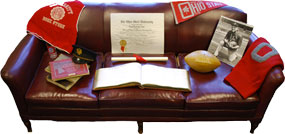The year is 1966. Novice Gail Fawcett is President of the University. Two brand new residence halls have just opened on campus: Archer House and Morrill Tower. October will be a big month for Ohio State with the groundbreaking for the Newark Branch Campus and Marion Branch Campus on October 27th and 28th respectively. Then on November 1st members of the Ohio State University Touring Company departed Columbus for Thule Air force Base in Greenland.
The Ohio State University Touring Company partnered with the United Service Organization (USO) and the American Educational Theatre Association (AETA) to perform the musical “Stop the World – I Want to Get Off” for troops in the Northeast Area. The students performed in front of troops as part of the North Atlantic Command Tour, which visited: Greenland, Labrador, Newfoundland, Iceland. Ohio State was given this opportunity to perform abroad by applying to the USO directly and was one of a select few universities to be chosen.
The musical comedy centers around the life of a character named Littlechap “whose ambition and good luck lead him to…success”[1]. Ted Pettit played the main character and was supported by Bev Pettit. Dr. Crepeau, director of the musical, managed to help his cast perform a difficult musical to a well deserving audience outside of the United States. Because of the demands of the musical, students were required to continue rehearsals abroad.
This was one of many trips that Dr. Crepeau would take his students on during his tenure at OSU. In 1984 Dr. Crepeau would take his other students to Berlin and Moscow to see several different musicals and plays as part of a larger effort to introduce students to different types of theatre.
According to the financial statements, the tour cost $935.24 to produce. $384.61 was spent on costumes, $204.47 on lighting, $55.86 on shipping charges, $194.07 on Hardware and misc., $15 on make-up, $10.39 on music, and $70.84 on publicity.
 Overall, the tour was a great experience for the students to perform at venues and for diverse audiences which would not have been possible without the USO and AETA. Most importantly thought, it gave the University a chance to give back to U.S. troops stationed abroad during a time when many other students across the country began protesting the Vietnam War and those serving in the military.
Overall, the tour was a great experience for the students to perform at venues and for diverse audiences which would not have been possible without the USO and AETA. Most importantly thought, it gave the University a chance to give back to U.S. troops stationed abroad during a time when many other students across the country began protesting the Vietnam War and those serving in the military.
Information for this blog was provided by the newly accessioned materials from the Department of Theatre.
[1] Fenton, Charles G. “‘Stop the World’ Triumphs in U – Hall.” OSU Lantern [Columbus] 1 Dec. 1965: n. pag. Print.




Recent Comments